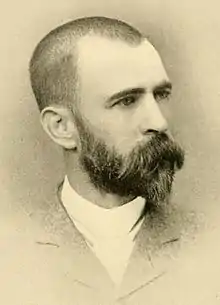Horace R. Buck
Horace Riverside Buck (September 18, 1853 – December 6, 1897) was a justice of the Montana Supreme Court in 1897, having died in office the same year that he joined the court.
Horace Riverside Buck | |
|---|---|
 | |
| Justice of the Montana Supreme Court | |
| In office 1897–1897 | |
| Preceded by | William H. DeWitt |
| Succeeded by | William Trigg Pigott |
| Personal details | |
| Born | September 18, 1853 Yazoo County, Mississippi, U.S. |
| Died | December 6, 1897 (aged 44) Lewis and Clark County, Montana, U.S. |
| Cause of death | Gunshot wound |
Early life and education
Born in Yazoo County, Mississippi, to Charles L. and Maria I. Buck.[1][2] His father was "one of the most eminent jurists and advocates of his state",[2] and one of the few prominent Mississippians to publicly oppose secession during the American Civil War,[1] and his mother was a well-regarded author.[2][3] Buck's father died in Vicksburg, Mississippi, in 1862, and the family remained in that city during the 47 day siege that ran from May 18, 1863, to July 4, 1863.[1] During this time, the family had to live in the cellar of the house to escape the risk of Union bombardment.[1] After the war ended, the family moved to Bayou Teche area in St. Mary Parish, Louisiana, and then in 1869 to join relatives living outside Sedalia, Missouri.[1]
Buck moved to New Haven, Connecticut, to attend Hopkins Grammar School in order to gain admission to Yale College.[1] He graduated from Hopkins in 1872, and from Yale in 1876,[1][3] ranked high in his class and receiving academic honors for his oratory skill.[2] He then moved to St. Louis, Missouri where he taught night school to make ends meet,[1] and studied law at the Saint Louis University School of Law, and in the offices of the prominent St. Louis law firm of Noble & Orrick;[2] law firm partner John Willock Noble described him as "the best student he had ever known".[1]
Legal career
Buck gained admission to the bar in Missouri in 1878,[2] but chose to pursue success in other regions, working for part of that year as a harvest hand in Dakota Territory, and as principal of a public school in Shakopee, Minnesota.[1] In 1879, Buck began a law practice in Fort Benton, Montana, in partnership with longtime friend William Henry Hunt (who also went on to serve on the Montana Supreme Court).[2]
On August 16, 1881, Buck married Mary E. Jewett, daughter of Dr. Pliny Jewett, a distinguished New England physician, in New Haven, Connecticut, with whom he had three children.[2] In 1884, Buck was elected to the Council, the higher branch of the Legislative Assembly of the Territory of Montana.[2][3] In 1887, he moved to Helena, Montana, where he continued in the practice of the law, and served for several years the official reporter of decisions of the Montana Supreme Court.[2] He also prepared and published a complete digest of the first eight volumes of the Montana Reports.[2] In 1891 he was appointed a District Judge for the First Judicial District of Montana, to fill a vacancy on the bench caused by the creation of an additional judgeship; and in 1892 was elected to the office of District Judge for a full term of four years.[2] In 1896 he was elected an associate justice of the Supreme Court of the State.[2][3]
Death
Buck died in Lewis and Clark County, Montana, of a self-inflicted gunshot wound to the head, at midnight on December 6, 1897. Earlier that day, he had taken part in considering two cases before the court.[2] The coroner noted that it was impossible to determine whether the shooting was intentional or accidental.[1]
References
- Ken Robison, Confederates in Montana Territory: In the Shadow of Price's Army (2014), Ch. 5.
- Bach, Thomas C., editor, Reports of Cases Argued and Determined in the Supreme Court of Montana from June 7, 1897 to March 21, 1898 (1898), Volume 20, p. 591-94.
- "State Bar Offers Sympathy", The Helena Independent (December 16, 1897), p. 8.